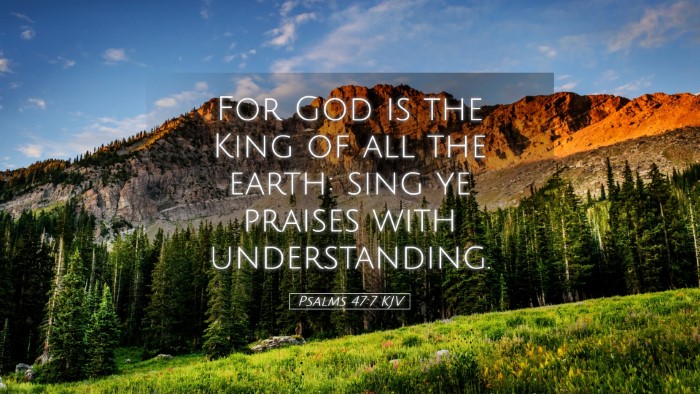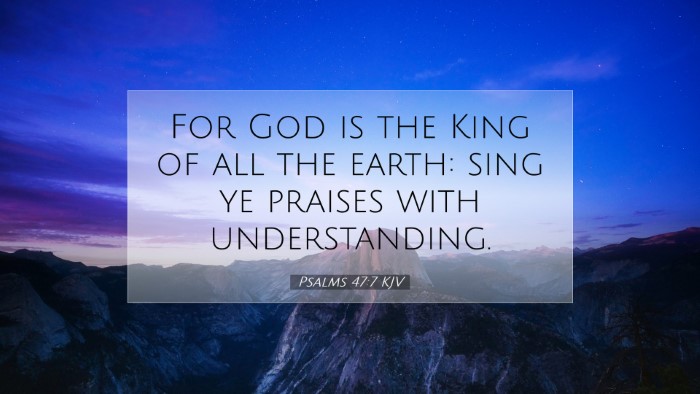Psalms 47:7 Commentary
Verse: "For God is the King of all the earth: Sing ye praises with understanding."
Introduction
The Psalms are often regarded as the heart of the biblical literature, offering profound insights into human emotion, divine majesty, and the character of God. In Psalms 47:7, we find a call to worship that encapsulates the essence of God’s sovereignty and our appropriate response through praise. This commentary seeks to explore the depth of this verse, drawing from esteemed public domain commentaries to enrich our understanding.
Contextual Analysis
The psalm sits within a liturgical celebration of God’s reign and the assurance of His dominion over the earth. Written amidst the backdrop of Israel’s history of trials and triumphs, Psalms 47 serves as both a reminder of God’s past deliverances and an invocation for present worship.
- Historical background: Psalms 47 is part of the Korahite psalms, possibly associated with the celebration of God’s kingship following military victories.
- Theological significance: The psalm presents God as not just the God of Israel but the Sovereign over all nations, reinforcing a universal kingship.
Exegesis of Key Phrases
To understand Psalms 47:7, we must delve into the key components of the verse:
"For God is the King of all the earth"
Albert Barnes highlights that acknowledging God as "King of all the earth" emphasizes His authority over creation and history. This proclamation elevates the understanding of God beyond a tribal deity to the Lord of the universe, deserving of universal reverence. Matthew Henry asserts that God's kingship is not bound by earthly limitations; instead, it extends to every nation and people group.
"Sing ye praises with understanding"
Adam Clarke notes that the imperative to "sing ye praises" serves both as an encouragement and a command. The call to worship is not to be mindless or rote; it is a worship that requires engagement of the mind and heart. Understanding in worship leads to genuine praise, where the worshiper recognizes and responds to God’s attributes and acts.
The Importance of Understanding in Worship
The call to worship with understanding underscores a profound biblical principle: true worship flows from a correct understanding of God. Matthew Henry states, "Ignorance in worship breeds superstition and counterfeit devotion." Therefore, it becomes imperative for pastors and leaders to emphasize theological education and spiritual formation.
- The role of teaching: Deepening congregational understanding through sound teaching is vital for authentic worship.
- Encouraging personal reflection: Congregants are urged to meditate on God’s nature to enhance personal worship experience.
The Broader Implications of God’s Kingship
In asserting God's sovereignty, this verse has profound implications for Christian engagement with culture and society. Albert Barnes emphasizes that the recognition of God's kingship should instill confidence in believers, even amidst societal upheaval. As followers of Christ, understanding that He reigns enables us to engage the world with hope and assurance.
- Engagement with the secular: Believers need to embody their faith within cultural contexts, showcasing a God who is relevant to all aspects of life.
- Anticipation of God's justice: The knowledge of His reign invites believers to work towards justice and mercy, reflecting His character in the world.
Conclusion
Psalms 47:7 serves as a rich source of theological reflection and a guide for worship practices. The combination of God’s sovereign rule and the imperative to worship with understanding forms a dynamic relationship between the divine and the human. For pastors, students, theologians, and scholars, this verse invites continual exploration into the nature of God and the depth of our response to Him.
As we conclude, let us remember that our understanding of God’s kingship not only fuels our worship but also informs our daily living in the authority and presence of the One who reigns over all. The true essence of worship transcends mere words; it is an acknowledgment of God’s greatness, rendered by lives transformed by His sovereign grace.


